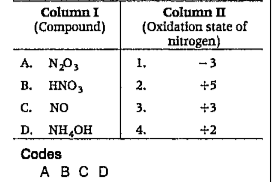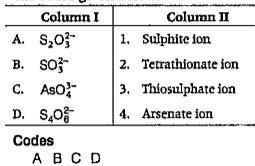Match Column - I with Column - II and Select the CORRECT option from the codes given below .
Column IColumn II1Monera(i)Chlamydomonas Solanum2Protista(ii)Bacillus, Ocillatoria3Fungi(iii)Euglena, Trypanosome4Plantae(iv)Mucor, Penicillium5Animalia(v)Felis , Panthera
1 - (iii) , 2 - (ii) , 3 - (iv) , 4 - (i) , 5 - (v)
1 - (ii) , 2 - (iii) , 3 - (iv) , 4 - (i) , 5 - (v)
1 - (ii) , 2 - (iii) , 3 - (i) , 4 - (iv) , 5 - (v)
1 - (ii) , 2 - (v) , 3 - (i) , 4 - (iv) , 5 - (iii)
The correct Answer is:B
To solve the question of matching Column I with Column II, we will analyze the kingdoms in Column I and their respective examples in Column II.
1. Identify the Kingdoms in Column I:
- Monera
- Protista
- Fungi
- Plantae
- Animalia
2. Identify the Examples in Column II:
- (i) Chlamydomonas, Solanum
- (ii) Bacillus, Oscillatoria
- (iii) Euglena, Trypanosome
- (iv) Mucor, Penicillium
- (v) Felis, Panthera
3. Match Monera:
- Monera includes unicellular organisms like bacteria. The examples given are Bacillus and Oscillatoria, which are both bacteria.
- Match: Monera → (ii) Bacillus, Oscillatoria
4. Match Protista:
- Protista includes unicellular and simple multicellular organisms. The examples given are Euglena and Trypanosome, which are both protists.
- Match: Protista → (iii) Euglena, Trypanosome
5. Match Fungi:
- Fungi are known for their spore-producing bodies. The examples given are Mucor and Penicillium, which are both fungi.
- Match: Fungi → (iv) Mucor, Penicillium
6. Match Plantae:
- Plantae includes multicellular organisms that perform photosynthesis. The examples given are Chlamydomonas (a unicellular green algae) and Solanum (a genus of flowering plants).
- Match: Plantae → (i) Chlamydomonas, Solanum
7. Match Animalia:
- Animalia includes multicellular organisms that are heterotrophic. The examples given are Felis (cats) and Panthera (big cats).
- Match: Animalia → (v) Felis, Panthera
Final Matches:
- Monera → (ii) Bacillus, Oscillatoria
- Protista → (iii) Euglena, Trypanosome
- Fungi → (iv) Mucor, Penicillium
- Plantae → (i) Chlamydomonas, Solanum
- Animalia → (v) Felis, Panthera
Summary of Matches:
1. Monera → (ii)
2. Protista → (iii)
3. Fungi → (iv)
4. Plantae → (i)
5. Animalia → (v)
Correct Option:
The correct option based on the matches is the one that corresponds to these pairings.
---
- Monera
- Protista
- Fungi
- Plantae
- Animalia
- (i) Chlamydomonas, Solanum
- (ii) Bacillus, Oscillatoria
- (iii) Euglena, Trypanosome
- (iv) Mucor, Penicillium
- (v) Felis, Panthera
- Monera includes unicellular organisms like bacteria. The examples given are Bacillus and Oscillatoria, which are both bacteria.
- Match: Monera → (ii) Bacillus, Oscillatoria
- Protista includes unicellular and simple multicellular organisms. The examples given are Euglena and Trypanosome, which are both protists.
- Match: Protista → (iii) Euglena, Trypanosome
- Fungi are known for their spore-producing bodies. The examples given are Mucor and Penicillium, which are both fungi.
- Match: Fungi → (iv) Mucor, Penicillium
- Plantae includes multicellular organisms that perform photosynthesis. The examples given are Chlamydomonas (a unicellular green algae) and Solanum (a genus of flowering plants).
- Match: Plantae → (i) Chlamydomonas, Solanum
- Animalia includes multicellular organisms that are heterotrophic. The examples given are Felis (cats) and Panthera (big cats).
- Match: Animalia → (v) Felis, Panthera
- Monera → (ii) Bacillus, Oscillatoria
- Protista → (iii) Euglena, Trypanosome
- Fungi → (iv) Mucor, Penicillium
- Plantae → (i) Chlamydomonas, Solanum
- Animalia → (v) Felis, Panthera
1. Monera → (ii)
2. Protista → (iii)
3. Fungi → (iv)
4. Plantae → (i)
5. Animalia → (v)
The correct option based on the matches is the one that corresponds to these pairings.
Topper's Solved these Questions
Similar Questions
Knowledge Check
- Question 1 - Select One
Match Column - I with Column - II and select the CORRECT option form the codes given below
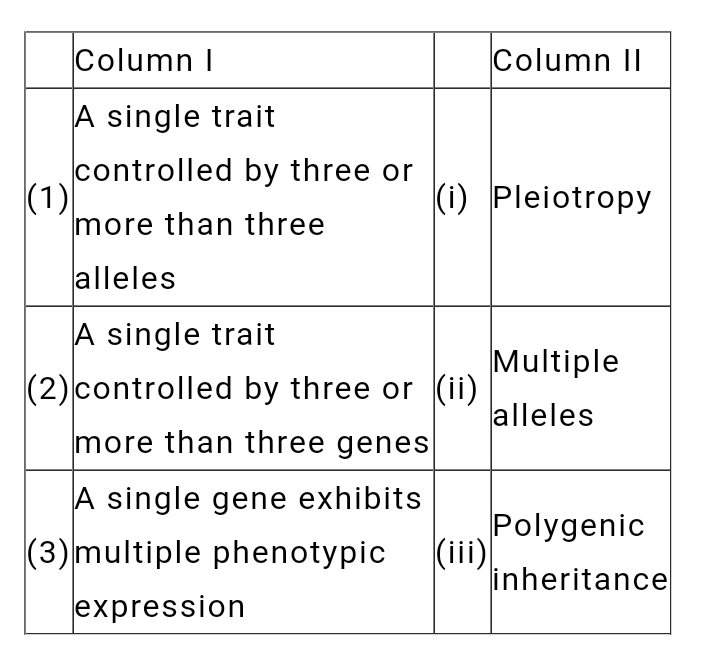 A1 - (ii) , 2 - (iii), 3 - (i)B1 - (iii) , 2 - (ii), 3 - (i)C1 - (i) , 2 - (ii), 3 - (iii)D1 - (ii) , 2 - (i), 3 - (iii)
A1 - (ii) , 2 - (iii), 3 - (i)B1 - (iii) , 2 - (ii), 3 - (i)C1 - (i) , 2 - (ii), 3 - (iii)D1 - (ii) , 2 - (i), 3 - (iii) - Question 2 - Select One
Match the Column I with Column II and select the correct option from the codes given below.
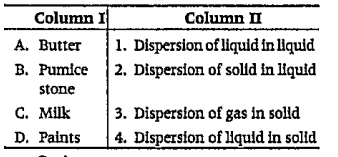 AA - (i), B - (ii), C-(iii), D - (iv)BA - (iv), B - (i), C-(ii), D- (iii)CA - (iv), B - (iii), C-(ii), D- (i)DA - (iii), B - (iv), C-(i), D - (ii)
AA - (i), B - (ii), C-(iii), D - (iv)BA - (iv), B - (i), C-(ii), D- (iii)CA - (iv), B - (iii), C-(ii), D- (i)DA - (iii), B - (iv), C-(i), D - (ii) - Question 3 - Select One
Match the Column I with Column II and select the correct option from the codes given below.
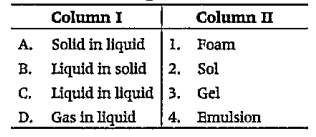 AA - (i), B - (ii), C-(iii), D - (iv)BA - (iv), B - (i), C-(ii), D- (iii)CA - (iv), B - (iii), C-(ii), D- (i)DA - (iii), B - (iv), C-(i), D - (ii)
AA - (i), B - (ii), C-(iii), D - (iv)BA - (iv), B - (i), C-(ii), D- (iii)CA - (iv), B - (iii), C-(ii), D- (i)DA - (iii), B - (iv), C-(i), D - (ii)
Match the column I with column II and select the correct option from the codes given below.
 View Solution
View SolutionMatch the column-I with column-II and select the correct option from the codes given below.
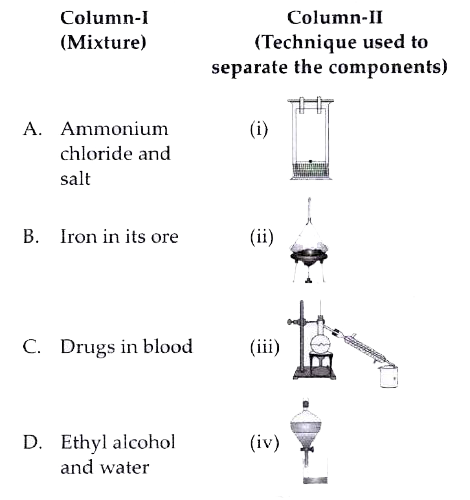 View Solution
View SolutionMatch the column I with column II and select the correct option from the codes given below.
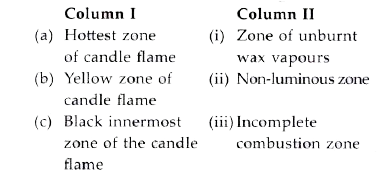 View Solution
View SolutionMatch the column I with column II and select the correct option from the codes given below
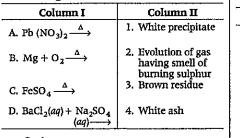 View Solution
View SolutionMatch the column I with column II and select the correct option from the codes given below
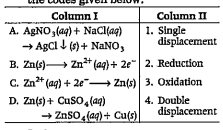 View Solution
View Solution


